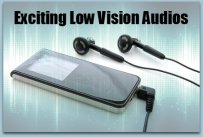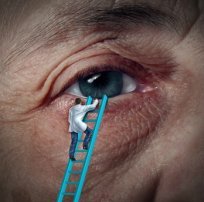struggling with vision loss

For seniors who are struggling with vision loss, things may seem overwhelming as your day-to-day life begins to change. However, you are not alone, and there are many people and organizations that want to help. There are countless resources available to answer questions, provide adaptive products, and help you maintain an active, independent lifestyle. For starters, the American Council of the Blind has posted an in-depth article on this subject on their website thanks to the permission of its three authors. It can be viewed here: Are You a Senior Citizen Struggling with Vision Loss? This document is lengthy and may seem overwhelming at first glance, so I have broken it down and brought you the highlights.
Seek Proper Diagnosis and Treatment
Nearly everyone loses some clarity of vision as they age, but some conditions can cause moderate to severe vision loss. Regularly visiting an eye doctor is the best way to help catch a condition early and track its development. Millions of Americans have one or more of these four common eye diseases:
- Age-Related Macular Degeneration (AMD): causes central vision loss
- Diabetic Retinopathy: develops spotty vision
- Cataracts: leads to blurred or seemingly filmy vision
- Glaucoma: triggers peripheral vision loss
In most cases, proper diagnosis and treatment can help slow the progression of an eye disease. For example, many people undergo surgery for cataracts or use prescription eye drops to reduce pressure caused by glaucoma. Your eye doctor can help you determine the best treatment options, and direct you to additional resources for coping with your changing vision.
Stay Positive and Prepare for Some Changes
Find someone aside from your doctor whom you can talk to about your vision loss. Confiding in someone will help keep you from feeling isolated, and he or she can help you take a few initial steps to improve conditions in your home. The American Foundation for the Blind recommends several tips to help make your home safe and frustration-free:
- Only work or read near a strong lamp or in an otherwise well-lit room
- Rearrange your furniture to create clear pathways through your home
- Keep your lawn and sidewalk free of clutter and debris
- Mount grab bars in every bathroom
- Install under-cabinet lighting or utilize task lights for any dark areas of your home
As you begin to adapt to your changing vision, try to stay positive. There will be some adjustments, but you should not become despondent. There is no reason to give up doing the things you love, as there are adaptive products to help you stay independent and continue almost all activities.
Utilize Adaptive Products and Technologies to Live a Normal Life
Low vision technologies continue to improve, making it possible to perform almost any everyday activity as usual. For example, there are tools to help you prepare meals, use a cell phone, shop in stores, browse the Internet, and read books and newspapers. Voice-enabled products are more common than you might realize, and are a great tool for everyday activities. You can also find many resources to help you adapt to these new technologies and learn how to navigate your home and city safely and confidently.
The types of available products range from high-powered magnifiers to talking devices. Items for the home include talking clocks, microwaves, and thermostats. You can also label foods, prescriptions, and bathroom necessities to make your everyday life easier. More advanced technologies include screen-reading software and tools for scanning and reading documents. Plus, there are many great smartphone applications available, including apps for audiobooks or large-print e-books. No matter how severe your vision loss is, you can still have access to both physical and digital printed materials including newspapers, e-books, and e-mail.
Additional Resources
The article posted by the American Council for the Blind also includes a long list of references for those adapting to living with low vision. Scroll past the article posted on their site to find websites and contact information for many services and organizations that support the visually impaired. Low Vision Technologies is an ideal source for numerous adaptive products and technologies, but you will also find information on the National Eye Institute, Glaucoma Foundation, and Lions Clubs International, among others. As always, stay tuned to our homepage for information about new technologies and tips for living with vision loss.

















